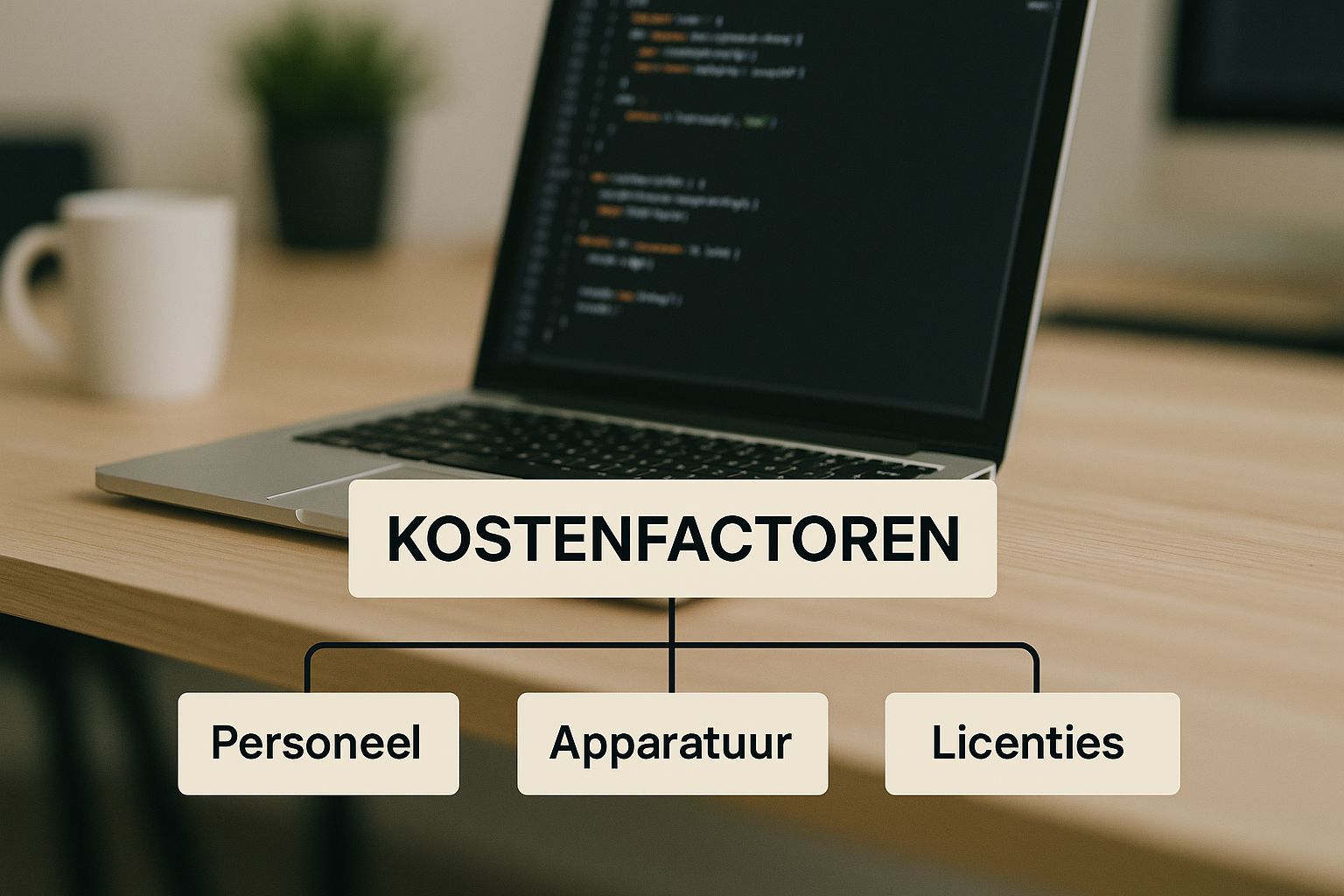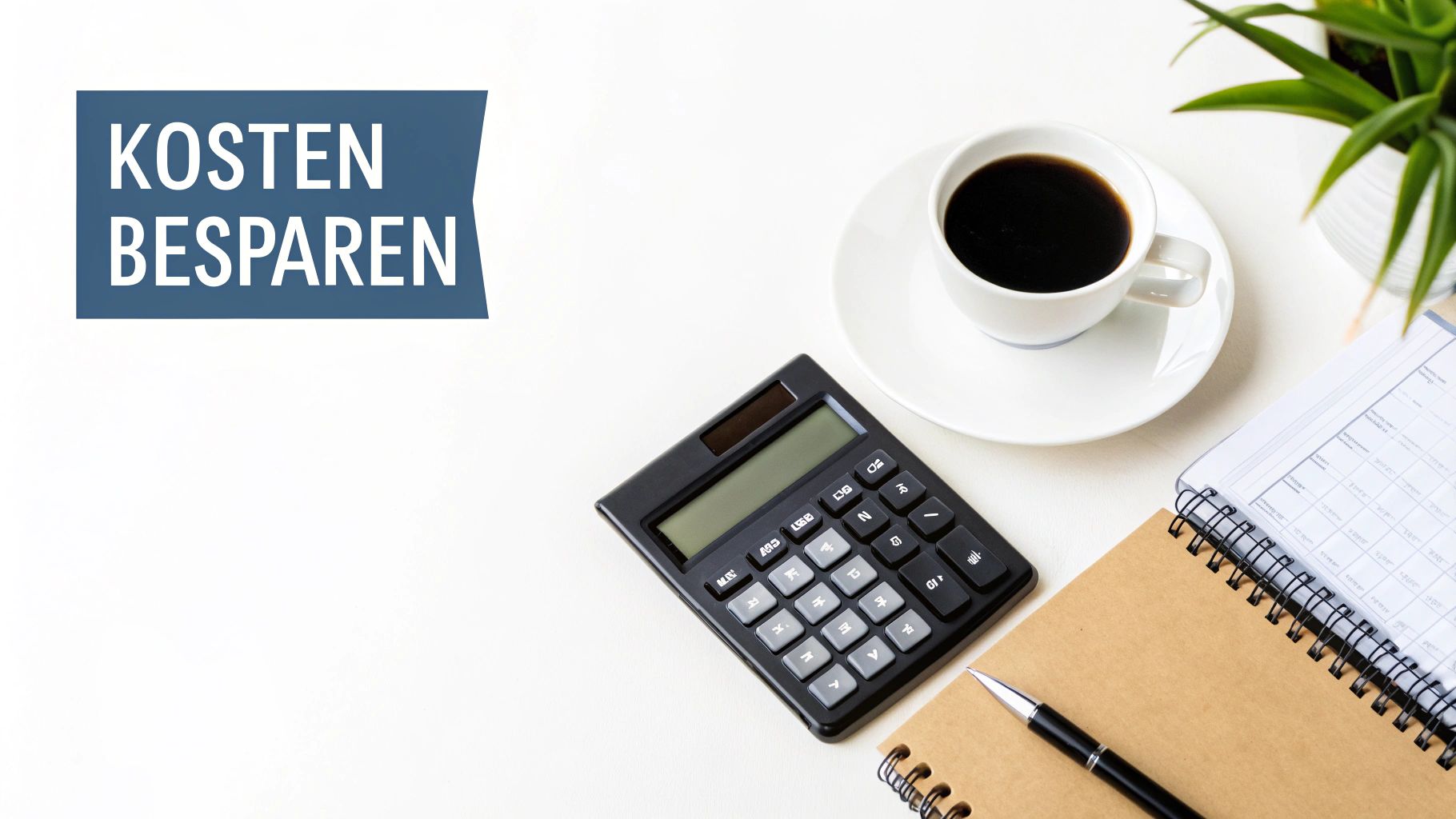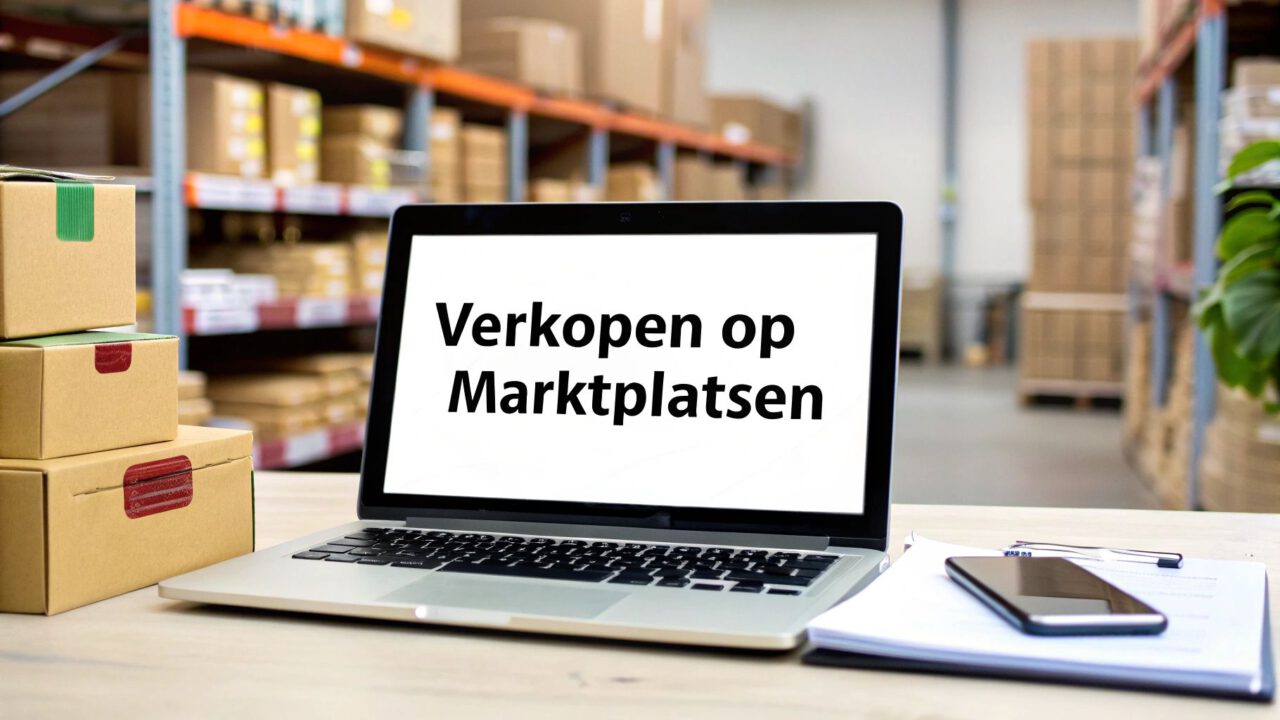The first question almost everyone asks is: "How much does it actually cost to have a website built?" It's a simple question, but the answer is anything but simple. Don't consider it a one-time expense, but rather an investment in your business's digital future. Choosing the right partner is absolutely crucial, because a successful project hinges on smooth and pleasant collaboration.
Investing in your online success: what does that entail?
A good website is so much more than an online brochure. It is your digital business card, your salesperson who 24/7 Ready and at the heart of all your marketing efforts. The real value isn't in the price tag, but in finding a strategic partner who understands your vision, is easily accessible, and helps your business grow.
Working with a web design agency isn't a quick transaction; it's a partnership. You're looking for a team that's not only technically strong but also proactively considers your business goals. Smooth and transparent communication is key to a successful project. The right partner feels like an extension of your own team.
More than just a price tag
It's tempting to compare quotes and focus solely on the price at the bottom of the page. But a good partner asks deeper questions than just "what features do you want?" They want to know who your target audience is, what your market is like, and where you want to go with your business. That strategic insight and that collaborative spirit are precisely what distinguish a standard website from a powerful marketing tool.
This guide will help you understand the factors behind the costs of a website To unravel. We don't just focus on price, but primarily on the value of smooth collaboration. We discuss, among other things:
- The elements that determine the price
- Realistic budgets for the Belgian market
- How to Evaluate a Quote on More Than the Final Price
- The importance of post-launch support
A successful website is the result of a strong alliance. It's not about the cheapest code, but about the most valuable collaboration that drives your business forward and maximizes your investment.
Ultimately, you want a partner who takes care of everything and makes collaboration seamless, so you get a digital platform that truly works for you. By asking the right questions and focusing on the quality of the collaboration, you ensure a long-term return on your investment.
By the way, did you know that subsidies are available for certain projects? Read more about them certification for the SME portfolio and discover the possibilities.
Why website prices vary so much
The question "how much does a website cost?" is just as difficult to answer as the question "how much does a house cost?" No one will deny that there's a world of difference between a simple garden shed and an architectural villa with a pool and home automation. The answer depends entirely on the size, the materials, the finishes, and all the extras.
The exact same principle applies to websites. The final price is a sum of several crucial factors. Once you understand these factors, it suddenly becomes much easier to compare quotes and choose the right partner. After all, the goal isn't to find the cheapest option, but to get the most value for your investment through a smooth and efficient collaboration.
The foundation: design and technology
Everything starts with the basics: the design. This is where you immediately encounter the first major hurdle, which significantly impacts the cost. Will you choose an existing template or a completely unique, custom design?
A template A pre-designed layout is essentially a pre-designed layout that a web designer can adapt to your corporate identity. This is often a faster and more budget-friendly approach, ideal for startups or projects with a clear, limited scope. You choose an existing structure and fill it with your content.
Custom design is a completely different story. A designer starts with a blank slate and, in close collaboration with you, creates a unique concept that seamlessly aligns with your brand, your goals, and the specific needs of your target audience. This process requires more time, creativity, and strategic thinking, which naturally increases the price tag. The result, however, is a website that is truly yours and sets you apart from the rest.
The technology running under the hood also plays a role. A standard website on a popular CMS such as WordPress has a very different price than a complex platform that needs to be linked to specific software packages.
Think of it as the difference between a ready-made suit and a bespoke suit. A ready-made suit can be altered and fits perfectly, but a bespoke suit is made specifically for you and fits like a glove. Both dress you, but the feel, look, and fit are incomparable.
Below you'll find an overview of the factors we just discussed, plus some others that influence price.
Overview of the most important cost factors
This table provides a detailed overview of the various elements that determine the final price of a website, including an indication of their impact.
| Cost factor | Description | Price Impact (Low/Medium/High) |
|---|---|---|
| Design (Template vs. Custom) | Choose between a customizable, pre-designed layout and a unique design from scratch. | High |
| Complexity of functionalities | Ranging from a simple contact form to a complete webshop or booking tool. | High |
| Content Management System (CMS) | The platform you use to manage the website (e.g. WordPress, Drupal, customization). | Average |
| Content creation | Writing texts, taking photos or videos. | Average |
| SEO optimization | Technical and content adjustments to improve your search engine ranking in Google. | Average |
| Web hosting and domain name | The annual costs of keeping your website online. | Low |
| Maintenance and support | Regular updates, backups, and post-launch technical support. | Low to Medium |
As you can see, there are quite a few factors to consider that influence the total price. Design and functionality generally have the greatest impact.
The design: functionalities and content
Once the foundation is in place, it's time to set up the "rooms" of your website. These rooms are the functionalities. Each additional feature adds value, but naturally, it also comes at a price. Complexity is the most important factor here.
Are the basics enough for you, or do you need more advanced tools?
- Basic functionalities: Think of a contact form, a photo gallery, or a simple blog. These are features that are practically standard.
- Advanced features: Here's where things get more specific. Consider an online booking tool, a multilingual website, a secure members area, or complex calculation modules.
- E-commerce: A complete webshop is often the most complex and therefore most expensive option. Consider product management, integrations with payment systems, and links to your inventory or accounting software.
The image below gives a nice visual representation of how all of these elements come together and determine the final price.

As you can see, design and functionality are the heavyweights, but the content side of the story also weighs heavily on the budget.
More than just technology: content and optimization
A technically perfect website is like a beautiful house without furniture: empty and uninviting. content – compelling copywriting, professional photos, and videos – is what captivates and convinces your visitors. If you don't have the time or skills to create that content yourself, you'll need to budget for it. A good content strategy often develops in collaboration with your web partner.
In addition, SEO (Search Engine Optimization) No longer an optional luxury, but a pure necessity. What good is a beautiful website if no one can find it? A smart web partner builds SEO into the structure, technology, and content from day one. This ensures that search engines like Google understand what your site is about, resulting in a higher ranking in search results. The depth of this optimization has a direct impact on the costs of your website.
Ultimately, it is the sum of all these parts – from design and code to copy and SEO – that determines the final investment.
Realistic budgets for your website in Belgium

Okay, now that we've covered the various factors that determine the price of a website, it's time for some concrete figures. What does a website really cost in Belgium? Fortunately, the market offers solutions for every type of entrepreneur, whether you're a starting sole proprietor or an established SME with international dreams. The right budget, therefore, depends entirely on where you are now and where you want to go.
Let's break down the options into three clear categories. This will give you a clear and realistic picture of the investment that best suits your goals.
Starter package for a strong first impression (€750 – €2,500)
Are you just starting out as a startup, freelancer, or do you own a small, local business? Then your first goal might be simple: a professional online presence. You need a digital business card that provides potential clients with the essentials at a glance: who you are, what you do, and how they can reach you.
In this price range, you can expect a solid, well-functioning website, often built on a reliable platform like WordPress. The focus here is on efficiency and a quick launch, without too many bells and whistles.
What is usually included in such a package?
- A design based on a premium template, which is adapted to your corporate identity with your logo, colours and fonts.
- The essential pages: a home page, an 'about us' page, an overview of your services or products, and a contact page with a form.
- Technical basic SEO, so that search engines can immediately find and index your site.
- Responsive design, because your website should look perfect on every smartphone, tablet and computer.
- A smooth collaboration with clear communication, aimed at fast delivery.
This is the ideal start to building your online presence without immediately taking a deep strategic dive. You'll lay a solid foundation that you can build upon later.
With this approach, you will achieve the professional appearance that is so crucial in the start-up phase of your business, even on a limited budget.
The comprehensive SME website (€2,500 – €7,500)
For most established SMEs, a simple online business card is no longer enough. Your website needs to play an active role in your marketing and sales. It becomes a machine that generates leads, informs customers, and strengthens your brand identity day in, day out. This calls for more customization and smarter functionality.
Within this budget, the focus shifts from simply having an online presence to truly performing online. Collaboration with your website builder becomes more intensive; it's no longer just about building, but also about strategic thinking. Recent figures show that a custom-built website in Belgium costs an average of between €750 and €7,500 Cost. If you have more complex needs, such as CRM integrations or advanced automation, the costs will logically be at the higher end of this range.
What extra do you get for this investment?
- A unique, custom-made design that perfectly reflects your brand identity and directly addresses your target group.
- Advanced features, think of a multilingual website, an online booking tool, or integrations with external software such as your CRM or newsletter system.
- Strategic content and in-depth SEO optimization to structurally improve your findability.
- A deeper collaboration, including workshops to focus on your goals and determine the right strategy.
This is the right choice for companies that see their website as an indispensable tool for growth.
Complex custom projects and e-commerce (€7,500+)
When your digital needs become highly specific, we enter the realm of pure customization. This applies to large e-commerce platforms, web applications with unique logic, or websites that need to interface seamlessly with complex business software. Costs here vary significantly and can rise significantly, depending on the complexity of your request.
In this segment, your website builder isn't just an executor, but a true technological and strategic partner. The collaboration is intensive, based on trust, and often long-term.
Consider projects such as:
- A fully custom-developed webshop with links to your inventory management, accounting package and logistics partners.
- An online platform with a members area, a paywall or complex interactive tools.
- Specific software integrations which require in-depth technical analysis and development.
Are you considering taking the step to online sales? Then it's good to know that the entry costs can be manageable. Discover how in our article full webshop can start from €1,500 for a basic setup. This proves that e-commerce is certainly not just for the very largest budgets.
Roll up your sleeves or hire a pro?
This is perhaps the most important question you should ask yourself. It's tempting to start working with tools like Wix, YourWeb or WordPressThe promise of low entry costs certainly sounds appealing. But what's the real price of that DIY approach?
This choice goes much deeper than just budget. It's a trade-off between your time, your technical expertise, and your long-term goals. Let's honestly compare both options so you can make a decision that truly suits your situation.
The lure (and pitfalls) of building your own
At first glance, building a website yourself seems like the cheapest option. A quick cost estimate in Belgium shows us that the annual costs for a custom-made website using tools like WordPress or Wix can indeed be kept low, often between €60 and €500This covers the basics: domain name, hosting, and a theme. More details can be found in this in-depth article about website costs.
But the financial picture is only one side of the story. The "hidden" costs are mainly in your own time and the steep learning curve you have to climb.
Please consider the following points:
- The time that goes into it: Learning a platform, selecting the right plugins, troubleshooting technical issues… it takes hours. Hours you can't spend growing your own business.
- Creative limitations: Templates are a great starting point, but you'll quickly run up against the limitations of standard options. Achieving a unique, professional look that perfectly reflects your brand is often difficult.
- Technical headaches: Without the proper knowledge, you are responsible for your site's security, updates, and speed. A small mistake can easily be made and leave your website vulnerable or excruciatingly slow.
- Missed Opportunities in Google: Ranking well in Google is more than just typing in a few keywords. Technical SEO, a logical structure, and engaging content are specializations in themselves.
The DIY route is perfect for those on a tight budget, with plenty of time to spare, and who genuinely enjoy delving into technology. However, you'll be on your own.
The added value of a strategic partner
When you hire a professional, you're not just paying for a final product. You're investing in a strategic partnershipThis is where smooth collaboration makes all the difference. You're not alone; a good website builder becomes an extension of your team, someone who thinks along with you and guides you through the entire process.
Everything starts with a good conversation. A professional partner asks the right questions. Not only what you want, but especially Why You want it. This is how they translate your business goals into a concrete digital strategy.
A web designer doesn't just build a website. They build a solution for your business challenges. That smooth communication and shared goal are the difference between a website that simply "exists" and one that truly delivers results.
By working with an expert, you reap the benefits of:
- Expertise and experience: You get immediate access to years of knowledge about design, usability (UX), conversion and SEO.
- Huge time savings: You can focus on what you do best: running your business. The web agency takes care of all the technical and creative work for you.
- A unique and effective result: A professional website is tailor-made for your target audience, exudes confidence and is designed to convert visitors into customers.
- One point of contact: Have a question or a problem? No hours of searching through vague internet forums. One email or phone call to your partner is all it takes.
Of course, the costs for having a website created by a professional. But what you're buying is more than just a website. You're buying peace of mind, expertise, and a partner committed to your online success.
Post-launch costs: what to consider?
Your website is online. Congratulations! You might think you've reached the finish line, but you're actually just getting started. A good website is never truly finished. Think of it as a digital extension of your business that requires attention, maintenance, and sometimes new investments to remain relevant and perform safely.
Many entrepreneurs are fixated on the initial costs for having a website createdThey forget to budget for what comes after the launch. A good partner will proactively point this out to you, so there are no unpleasant surprises. A smart entrepreneur looks ahead and realizes that online success is a marathon, not a sprint.
Why continuous maintenance is so crucial
You take your car to the garage for maintenance every year, don't you? Well, your website needs exactly the same. The digital world is constantly changing: software gets updated, new security risks emerge, and technology evolves rapidly. Without regular maintenance, your site becomes slow, an easy target for hackers, and certain features can suddenly stop working.
This is where a good partner proves its worth again. Most web builders offer a maintenance contract This isn't an unnecessary luxury, but rather an insurance policy that guarantees the continuity of your online business and strengthens the long-term partnership.
What does such a contract usually include?
- Technical updates: Regularly updating your CMS (such as WordPress) and all plugins. This keeps everything running smoothly and securely.
- Security scans: Proactively search for vulnerabilities and protect your website from malware and hackers.
- Backups: Make a backup copy of your website periodically. If something goes wrong, everything will be back online in no time.
- Support: A direct point of contact for technical questions or minor adjustments. That saves you a lot of headaches.
A maintenance contract is more than just a technical service. It's an agreement that your website developer not only builds a site but also remains your trusted partner to keep it healthy and successful in the long run.
Fixed annual costs
Besides maintenance, there are a few fixed costs that recur annually. These aren't usually huge sums, but you should include them in your budget to maintain an overview.
- Domain name registration: The annual rent for your unique web address (such as www.yourcompany.be).
- Web hosting: The rental of the server space where your website resides. The quality of your hosting has a huge impact on the speed and reliability of your site – which is crucial for the user experience and your Google ranking.
- Software licenses: Do you use premium plugins or specific software? You often have to renew their licenses annually.
Besides the construction costs, you also need to consider your domain name, hosting, and any extras like copywriting or professional photos. Especially if you also want to allocate marketing budgets for SEO or advertising, the total annual budget can be quite high. Read more about how to create a complete website. set a budget for your website which also includes these recurring items.
Budget for growth and marketing
Your website is the engine of your online marketing, but an engine needs fuel to run. So, also consider a budget for things like blog posts, search engine optimization (SEO), or online advertising (SEA).
A good partner doesn't stop at the technical delivery; they collaborate with you to truly maximize your investment. By looking ahead and budgeting realistically for the post-launch period, you'll build a solid and successful online future.
How do you choose the right partner for your web design?
Finding a website builder is one of the most crucial steps in your entire online journey. You're not looking for a supplier, you're looking for a partner. costs for having your website created Of course, these factors play a role, but don't get hung up on them. The cheapest quote is rarely the best. A smooth, strategic collaboration is priceless in the long run.
Ultimately, you want someone on board who isn't just technically proficient, but who truly understands your business. Someone who thinks along with you, challenges you, and communicates effortlessly. A good connection and a shared vision are the ingredients for a website that truly delivers results.
Look beyond the quote
A quote is just a piece of paper; it only tells part of the story. To truly understand who you're working with, you need to dig deeper. The success of your project depends entirely on the connection and whether the approach aligns with your vision. Good collaboration is the driving force behind a successful web project.
Start by delving into their portfolio. Ask yourself the right questions:
- Is there variety in the work? Do they show a range of styles and solutions for different types of businesses?
- Does the quality match your ambition? Do the websites look professional, modern and convincing?
- Do they deliver results? Ask for specific case studies. How has their work helped previous clients' businesses?
The real test is the first conversation. A partner who simply asks "what do you want?" is an executor. A partner who asks "why do you want this and who is your customer?" is a strategist. That second conversation is worth its weight in gold.
The importance of asking the right questions
During your initial conversations, pay close attention to the questions the web agency asks. Are they simply checking off a checklist of features, or are they trying to understand the core of your business? A strategic partner wants to know everything: who is your target audience, what are your competitors doing, and where do you want to take your company?
The quality of their questions reveals the depth of their approach. It demonstrates that they're not just building a website, but a digital machine designed to contribute to your growth. Smooth and open communication is key; you need to feel like you're on the same page.
Ask for references and after-sales service
A great portfolio is one thing, but the experiences of other clients are even more telling. So don't be shy and just ask for references. Call a few of their clients and ask how the collaboration went. Was the schedule met? Was communication clear? And perhaps most importantly: how is the support now that the website is live?
Clear agreements about maintenance and support are crucial. Your website needs updates and security. Make sure you know in advance who to call if something goes wrong and what the terms and conditions are. A good partner will communicate this transparently.
Are you an SME in Flanders? Then be sure to inquire about the subsidy options through the SME portfolioA partner who considers this demonstrates that they take your financial situation seriously. Choosing the right partner is the most important step towards online success.
Some frequently asked questions about the costs of a website
Investing in a website is a big step, and it's understandable that you'll have questions. The price tag is important, but the practicalities also play a role. Below, I'll answer some frequently asked questions to give you a clearer picture.
How soon will my website be online?
The lead time naturally depends on the complexity, but especially on how smoothly the collaboration flows. A good partner will guide you through this process and ensure clear planning and open communication.
A simple, informative website? That can often be created within 4 to 6 weeks live. The condition is that the content, such as text and photos, is delivered on time and that the feedback rounds run smoothly.
For a more comprehensive SME website, with more features and customization, you should rather think about 6 to 12 weeksLarge, complex projects like a comprehensive webshop can naturally take several months. A reliable partner will always estimate this in advance and include a realistic schedule in the quote. This way, you know exactly what to expect.
How does payment usually work?
Professional web design agencies in Belgium almost always work with installment plans. This is a good sign, as it demonstrates commitment from both parties. It also spreads the financial burden on you as the client.
Usually the structure looks like this:
- An advance payment at the start: This is often 30% to 50% of the total amount. This officially launches the project.
- An interim disk: This usually follows after an important milestone, for example when the graphic design has been approved.
- The balance upon delivery: The remaining amount will be invoiced once the website is ready to go online.
My tip: proactively ask about this during the initial meeting. A good partner will explain this transparently, so there are no surprises later.
What if I want to add a webshop later? How much extra will that cost?
Adding a webshop is a significant upgrade. The additional cost depends on the chosen platform, the number of products, and the necessary integrations with payment providers or an inventory system, for example. Expect an additional investment that can range from €1,500 to more than €5,000, on top of the cost of the basic website.
It's wise to discuss this wish early on, even if it's just an idea for the future. A partner who's willing to brainstorm with you can then build a scalable website. This means the technical foundation is laid in such a way that a webshop can be integrated much more smoothly—and therefore more cost-effectively—later. This is a perfect example of a partnership that looks beyond the current project.
Ready to take your online presence to the next level with a partner who truly thinks along with you? Then contact us Expert mediaWe translate your goals into a powerful website that delivers results. Discover what we can do for you.




